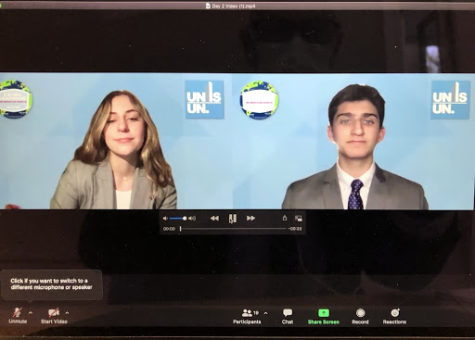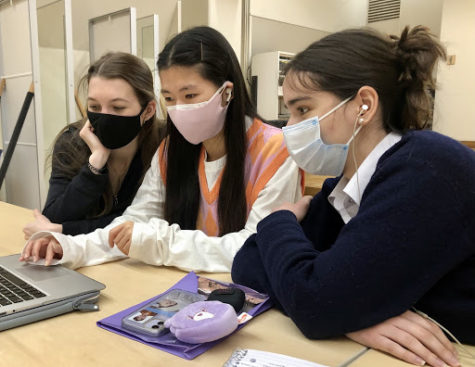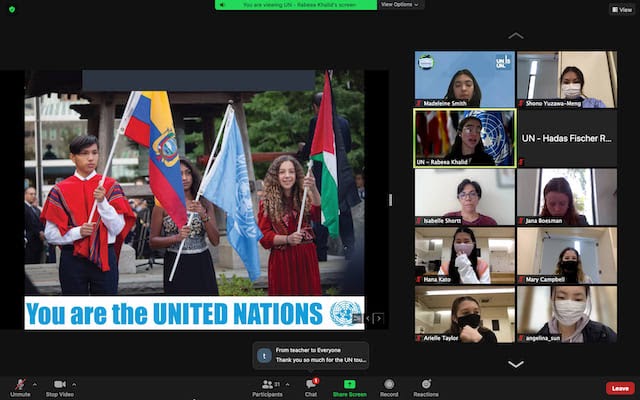photo credit: Sophie L. (G12)
Students participating in the UN Virtual Tour.
Zooming into the UNIS-MUN
On the 18th, 19th, and 20th of March the International Relations (IR) class participated in the United Nations International School (UNIS): Model United Nations (MUN). The UNIS, in New York City, hosts the MUN every year. Usually, students from international schools all over the world come to New York to take part. However, this year — due to COVID-19 — the MUN had to be conducted online, via Zoom. This was Sacred Heart’s first time participating in the UNIS-MUN.
The theme for this year’s conference was ‘Global Catastrophe: The Impacts of COVID-19’. By listening to a number of speakers and participating in workshops, the MUN attendees explored the relationship between COVID-19 and a number of different societal, environmental and economical issues.
To start off the conference, the principal and two students — Eva and Jack — of the UNIS introduced the event. Then, the IR class watched videos made by the schools attending the conference about how coronavirus has impacted each of their cities. One of Sacred Heart’s own students, Arianna B., had her video showcased: Tokyo Before & During COVID-19.

The first speaker was Dr. Anthony Fauci, who is the Chief Medical Advisor to the President of the United States. He talked about the ways in which coronavirus has significantly affected the world and how the pandemic will be overcome by vaccinating all nations. Dr. Fauci especially focused on the role RNA plays in vaccine development.
On the second day of the conference, students were given the choice between listening to Robert Jenkins or Professor Hasan Kwame Jefferies. Jenkins is UNICEF’s Global Director of Education and he explored the impact COVID-19 has had on education in least developed countries (LDCs). He highlighted the problem of the lack of resources for children in LDCs to undertake remote learning and how this problem must be solved. Jenkins focused on the disproportionate impact coronavirus has had on people of colour, explaining that this stemmed from the legacy of segregation, which resulted in more densely populated communities that were largely home to people of colour. Professor Jefferies highlighted the importance of not “falling into the colourblind trap,” and providing support for all communities in a way where everyone is provided for equitably.
Attendees were then given the choice between participating in a ‘UN Virtual Tour’ or a ‘Stand Up Against Anti-Asian American Violence’ workshop. The UN Virtual Tour gave an appreciation of the workings of the NYC UN headquarters. In the ‘Stand Up Against Anti-Asian American Violence’ session students learnt what to do in a situation where they are a bystander to such violence. They were taught tips such as “never approach the aggressor from behind or in front, instead approach from the side.”
Following the sessions, students watched a debate between four different students who were selected to debate either for or against the motion ‘Strict lockdowns are the most effective way in which states can protect their citizens’.
Day two of the conference concluded with Christiane Amanpour — the Chief International Anchor for CNN — and Dr. Sanjay Gupta — the Chief Medical Correspondent for CNN. They emphasized to the attendees the need for the media to be honest and reliable during such an unprecedented time as the pandemic because the media plays such a vital role in guiding the public in these situations.
To start day three of the conference, attendees listened to either Andrew Hudson or Ana María Bazán and Ismael García Colón. Hudson, who is the Head of the UNDP Water & Ocean Governance Programme in the Nature, Climate and Energy Team of UNDP’s Bureau for Policy and Programme Support, talked about the impacts coronavirus has had on the environment. He emphasized that the need to protect our oceans from climate change is still incredibly important, in part because it plays such a vital role in the world’s economy. Hudson underscored the need for sustainable tourism in the future and provided ways tourism can open up safely again, for example, by prioritizing the vaccination of people who work in the tourism industry.
Ana Maria Bazán and Ismael García Colón focused on the impact COVID-19 has had on immigrants and refugees. Issues such as densely packed refugee camps, family separation, border closure and migrant disparities in healthcare were all discussed. Bazán and Colón stressed the need for more funding for NGO groups to help solve these issues.
After this, the IR class participated in the ‘Life in a Refugee Camp during the Pandemic’ workshop or ‘The Environment Workshop’. In the first workshop students were chosen to be either refugees, NGOs or the camp organizers for the Zaatari Camp in Jordan — a camp that Sacred Heart students may know through Jordan Hattar, who was a guest speaker in 2019 and currently works with Syrian refugees in Jordan for the UNHCR. These groups were faced with theoretical problems and had to discuss in breakout rooms how they would go about solving them. The Environmental Workshop looked at how the problems of climate change and coronavirus both must be prioritized and how the world must work together to find solutions for these significant issues.

The conference ended with a second debate where selected students debated for or against the motion ‘It is ethical for COVID-19 vaccine makers to make a profit from vaccine development’. After the debaters had finished, students were again assigned breakout rooms where they could share some of their own opinions and then vote on who they thought won the debate.
The UNIS students who ran the Model United Nations were able to facilitate the participation of a vast array of students from all around the Asia Pacific region. This learning and development experience inspired the International Relations class to continue to better their understanding of global issues and create solutions for them.
